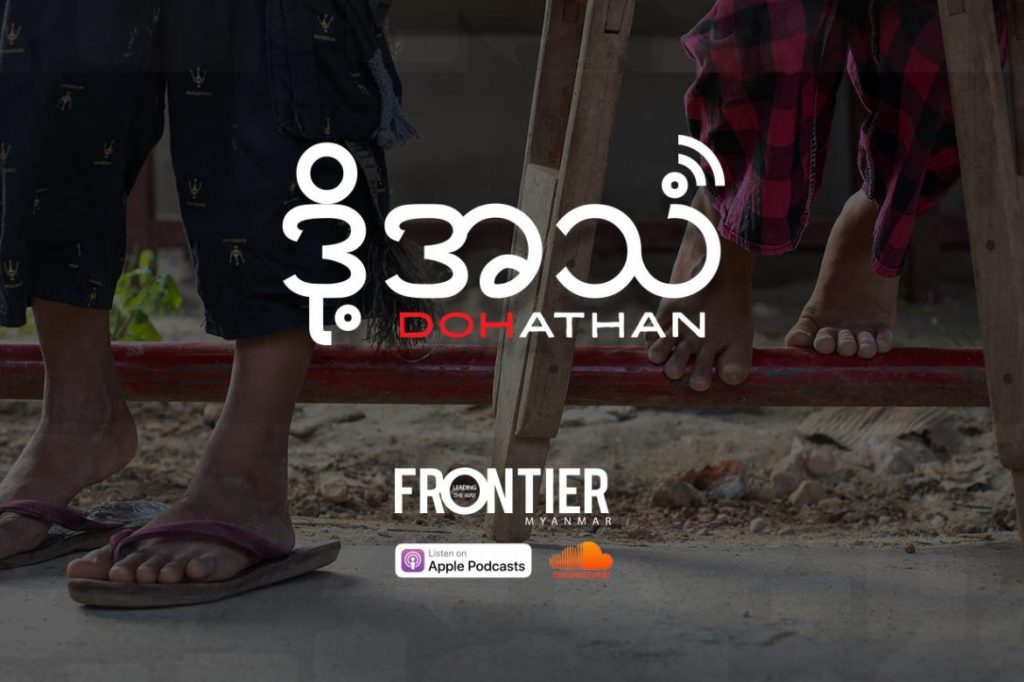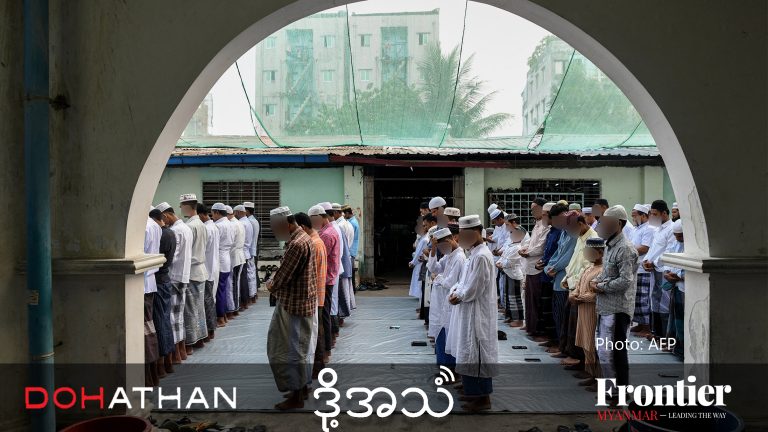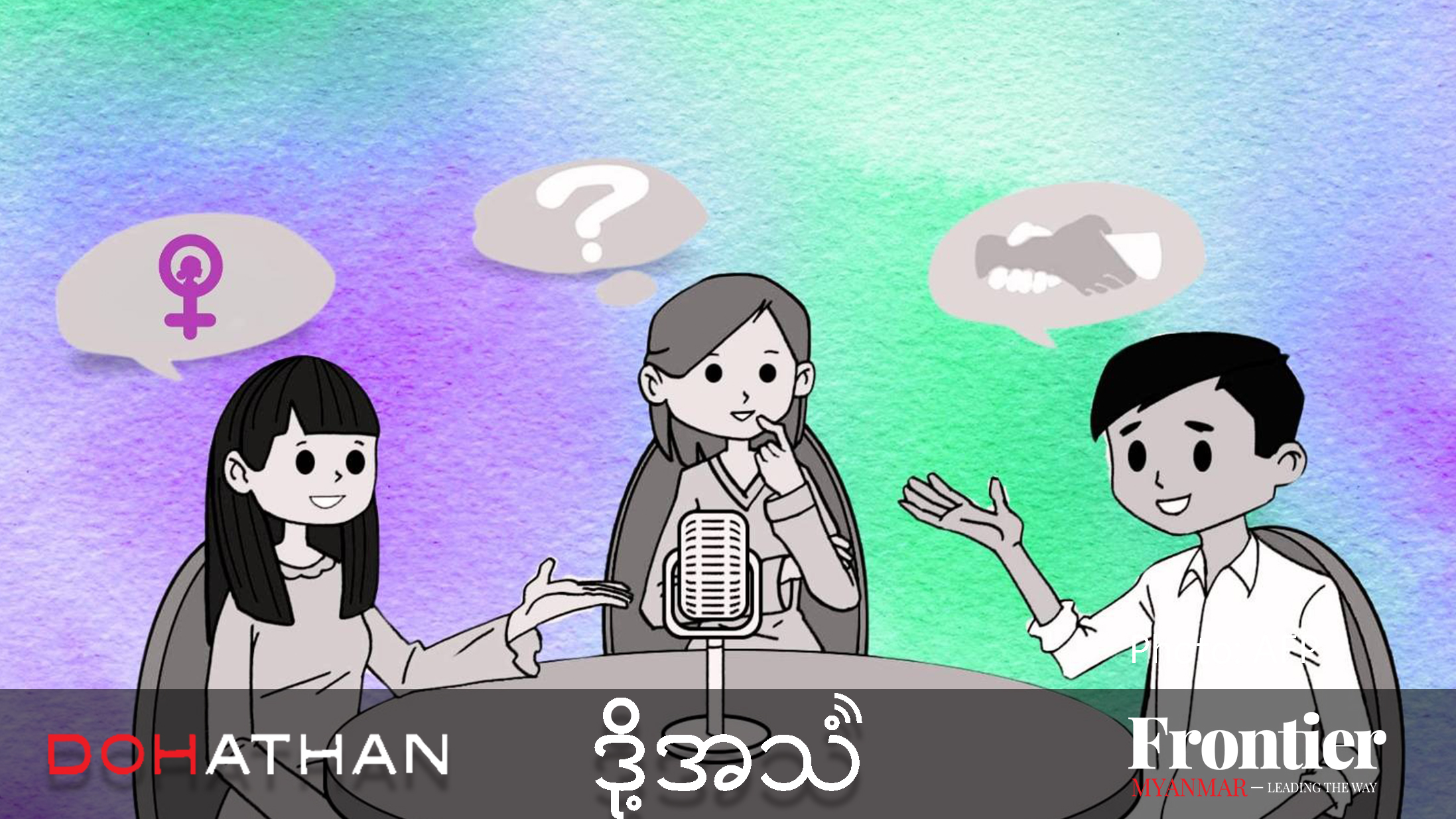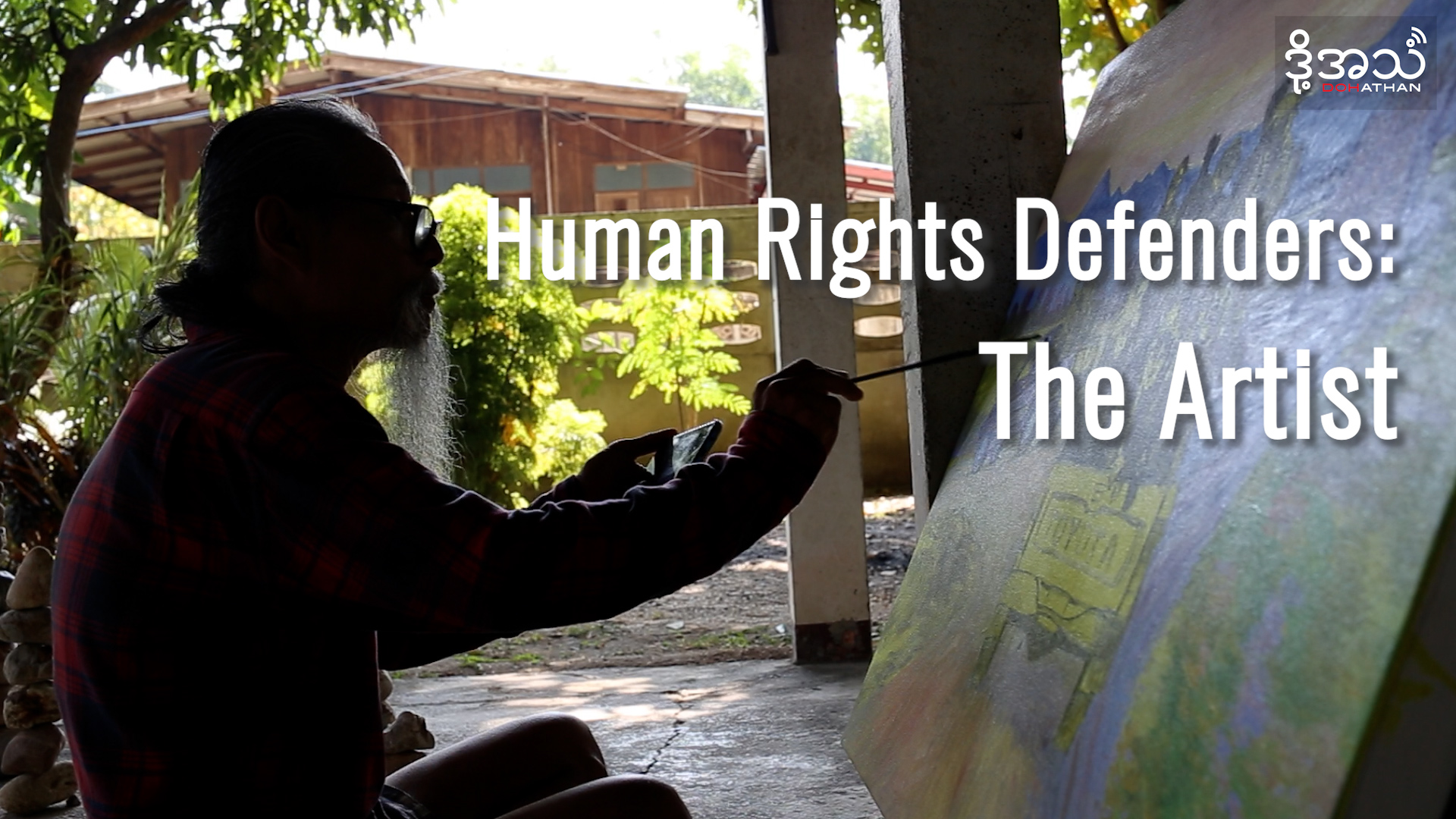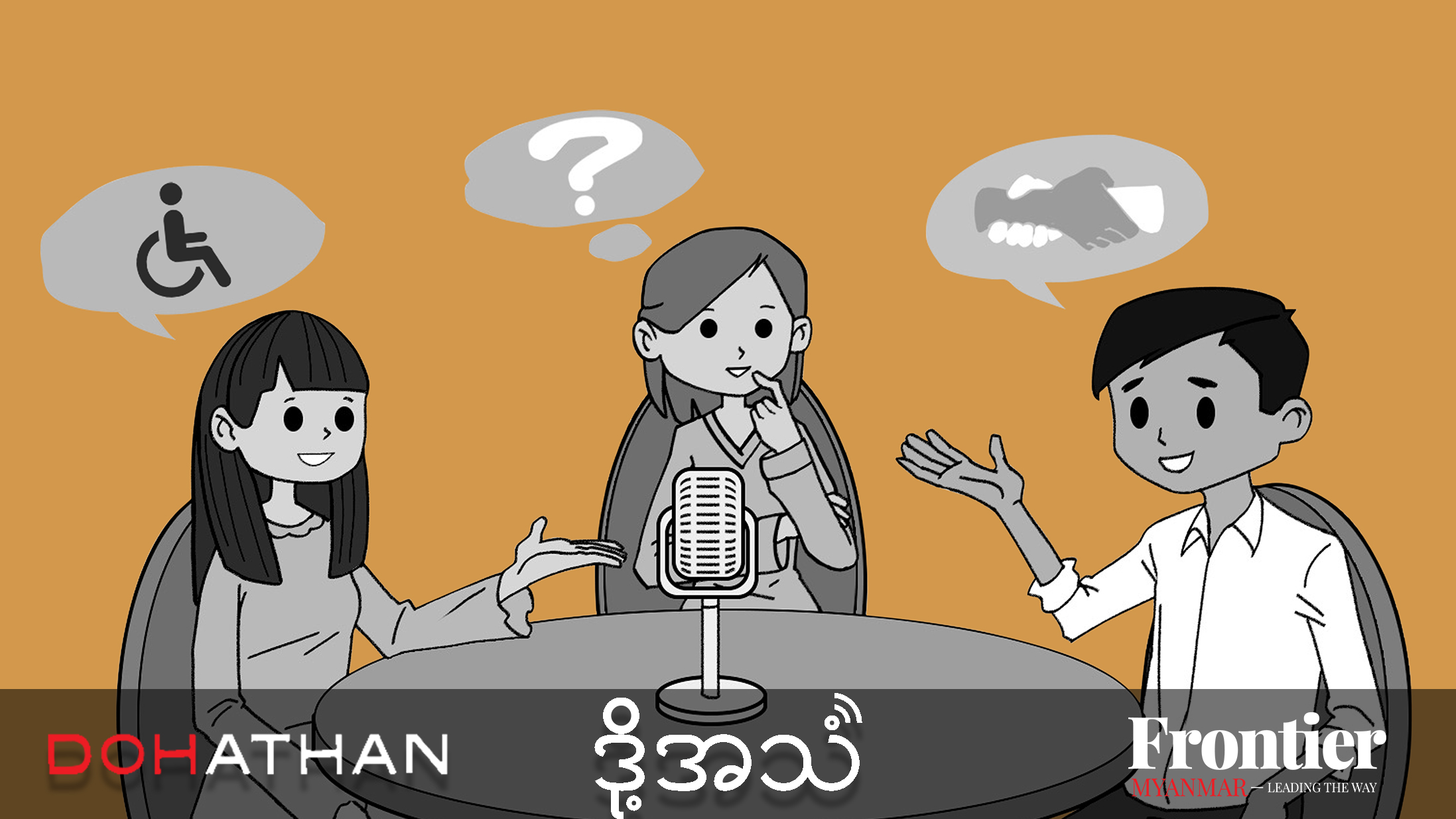Welcome to the third episode of Doh Athan.
This week we will be looking at some of the challenges faced by people with disabilities and debate around disability in Myanmar. Click the links below to listen on either Soundcloud or YouTube.
Episode 3 script
Win Zar Ni Aung: Mingalabar, welcome to Doh Athan, the new weekly Human Rights podcast from Frontier Myanmar. I am Zar Ni.
Support more independent journalism like this. Sign up to be a Frontier member.
Our pioneering audio programme, the first of its kind in Myanmar, gives us the opportunity to shine a spotlight on and speak to many voices about human rights issues that affect people across this beautiful country.
For many people in Myanmar the issue of disabilities remains a difficult subject.
Government financial support for the disabled is non-existent, their rights are limited and many old buildings and public transport lack suitable access for people with disabilities.
Official figures show there are some 2.3 million people in the country who are affected by some form of disability.
The filming of the new Myanmar movie “Ko Yoe Kar Yar”, and its portrayal of the disabled, has again thrust the issue into the spotlight.
Doh Athan this week looks at some of the challenges faced by people with disabilities and the debate around the issue in this country.
Like many people in Myanmar, Nan Paing Paing begins her day with the same routine. She makes breakfast, does her household jobs and says her daily prayers.
Once outside the comfort of her home, life could not be more different for the 27-year-old.
For most people, negotiating Yangon’s chaotic roads, uneven pavements and crammed buses is often difficult enough.
But for Nan Paing Paing, the challenge is far greater. She is blind.
Nan Paing Paing: “I miss the stop, I have to disembark. I don’t know where the bell which alarm the bus driver has to open the door. On the number 65 bus, they are making buttons for the blind. Some of the buses don’t drive in their right lane. Then I don’t know where I am and where the trishaw gate is. Because of this, I had to pay 1500 kyats for the trishaw yesterday.
Win Zar Ni Aung: Even though she takes the bus regularly, Nan Paing Paing sometimes misses her stop and ends up in the wrong place.
The trainee coordinator at Myanmar National Associate of the Blind also faces many other challenges, most notably discrimination from other people.
Nan Paing Paing: Sometimes, people can’t change their mindset. Even in the family, they discriminate. Discrimination is everywhere but it is less than before. I hope if we show our abilities, it will decrease. Sometimes, some of the people tease me when I walk, like saying there is a hole in front of me, but there is nothing. I feel so annoyed.
Rural areas are worse than Yangon. In that area, there is no one who will help, even when they are quiet near us. As they don’t want to help, they ignore us and keep silent, pretending no one is there. I think we will need more advocacy. I hope discrimination will decrease gradually.
Win Zar Ni Aung: Nang Paing’s plight is similar to that faced by millions of disabled people in Myanmar.
According to the 2014 Myanmar Population and Housing Census, of the total population of over 51 million, 4.6 percent or over 2.3 million are suffering from disabilities.
Negative perceptions and discrimination against disabled people in this country are widespread.
The filming of the new Myanmar movie “Ko Yoe Kar Yar” has again thrust the issue into the spotlight.
Some scenes portraying polio victims in the film were criticised for being mocking towards the disabled characters, prompting the script to be changed.
U Aung Ko Myint, chairman of the Myanmar Federation of People with Disabilities, there must be changes in all areas to help people with disabilities.
Aung Ko Myint: We don’t get equal rights. For example, transportation is difficult. Although some of the difficulties is releasing in the education sector from the higher levels, it cannot reach the bottom levels. We also don’t get equal rights in job opportunities. Besides, there is no support from the government, but we understand they don’t have the budget.
Win Zar Ni Aung: There are signs that the government will help bring about change.
Dr May Win Myint , a lawmaker in the Pyithu Hluttaw and member of the National League for Democracy’s executive committee, said the party was working to support the disabled.
May Win Myint: We elected three disabled people to compete in the 2015 election and they are now MPs. We know there are many difficulties for the disabled in school, especially to attend the classes and to enrol. It needs a long term plan. We will discuss in the Pyithu Hluttaw and we will try to decrease the problems of disable people.
Win Zar Ni Aung: A Rights of Persons with Disabilities Law was first discussed in 2015 and looks to be passed soon.
Nan Paing Paing said all disabled people yearned for the same thing.
Nan Paing Paing: We need to create a happy environment where there is no discrimination and no exclusion for the disabled.
Win Zar Ni Aung: Now we will round up some of the human rights stories currently affecting Myanmar now.
Thousands of refugees in Shan state are facing the threat of food shortages because of aid cuts.
The Shan State Refugee Committee said there are around 6,000 people in the camps near the Thai border.
The government has said it will help if the camps request aid.
U Zaw Htay, the Director General from State Counsellor’s Office said that State Counsellor Daw Aung San Suu Kyi has laid out the policy that government will pay for every expense related with food, education, and healthcare of these displaced people.
“Some non-government organizations are helping but if these NGOs cut the supply and there was a shortage, report to the government. The National Reconciliation and Peace Centre will lend a hand,” said U Zaw Htay.
“Those who manage the camps must tell us that there are no donors or the donations are no longer sufficient,” he said. “The NRPC has regular meetings. The State Counsellor, the Tatmadaw and the Hluttaw also attend these meetings. The Peace Commission also attends these meetings. After they consider the request, the decisions are set. Then we have to follow and implement their decisions.”
Refugees in IDP refugee camps on the Thailand border are not listed by the United Nations High Commissioner for Refugees and are not recognised by Thailand government.
Two Kachin men who escorted reporters to the site of an alleged Tatmadaw airstrike in northern Shan State have been given lengthy prison terms, in a case that has sparked international condemnation and renewed attention on the protracted civil conflicts in Myanmar’s north.
Dumdaw Nawng Lat, 67, and Langjaw Gam Seng, 35, were both convicted under the Unlawful Associations Act for their alleged support of the Kachin Independence Army and under the Import Export Act for operating motorcycles without a licence.
The duo, both members of the Kachin Baptist Convention, were sentenced to two years and three months’ imprisonment after a 10-month trial at the Lashio District Court.
Nawng Lat received an additional two-year sentence for defamation following a December 2016 interview with Voice of America, during which he relayed information on an alleged Tatmadaw airstrike campaign in Mongko Township the previous month.
“How many more human rights defenders have to be locked up before the world realises that the Myanmar military have no intention of being held to account for their crimes?” said Mr David Baulk of regional watchdog Fortify Rights.
Efforts to boost Myanmar’s struggling drug rehabilitation programme will begin next year with the reopening of five treatment centres.
Rehab hospitals in Kyawthaung in Tanintharyi Region, Nan Lat, Hare Khon and Musel in Shan State, and Myawaddy drug rehabilitation centre in Kayin State will begin receiving patients in 2018.
They have been closed for many years due to lack of government funding. The state-sponsored centres provide, among other forms of treatment, methadone to fight the withdrawal symptoms experienced by heroin users.
A new law is also being debated in the Hluttaw which will pave the way for a 3 year drug rehabilitation programme in Myanmar. It aims to shift the focus from punishing drug users to providing medical treatment.
In 2014, the country had 300,000 drug users, including 83,000 who use needles, according to research from the United Nations Office on Drugs and Crime.
Drug users who willingly register their addiction with police and health authorities can avoid criminal punishment under Myanmar laws, which set tough prison sentences for narcotics use, possession and sale, if they can enter mandatory methadone maintenance therapy at one of 46 hospitals across the country.
We hope you enjoyed the second edition of Doh Athan.
The program was put together this week by Zar Ni and AHtet.
You can read the above-mentioned news and other interesting articles via Frontier Myanmar’s website and Facebook pages and you could share your thoughts on these pages freely.
Please stay tuned for next Wednesday’s episode and visit the Doh Athan Facebook page.
The project to support human rights reporting is a partnership between Frontier Myanmar and Fondation Hirondelle, funded by the Embassy of the Netherlands in Myanmar.
Thanks for staying with us while broadcasting.
Have a nice day.


